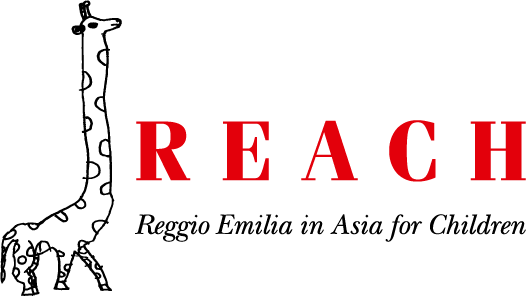- HOME
- ABOUT US
- REGGIO EMILA IN ASIA
Reach
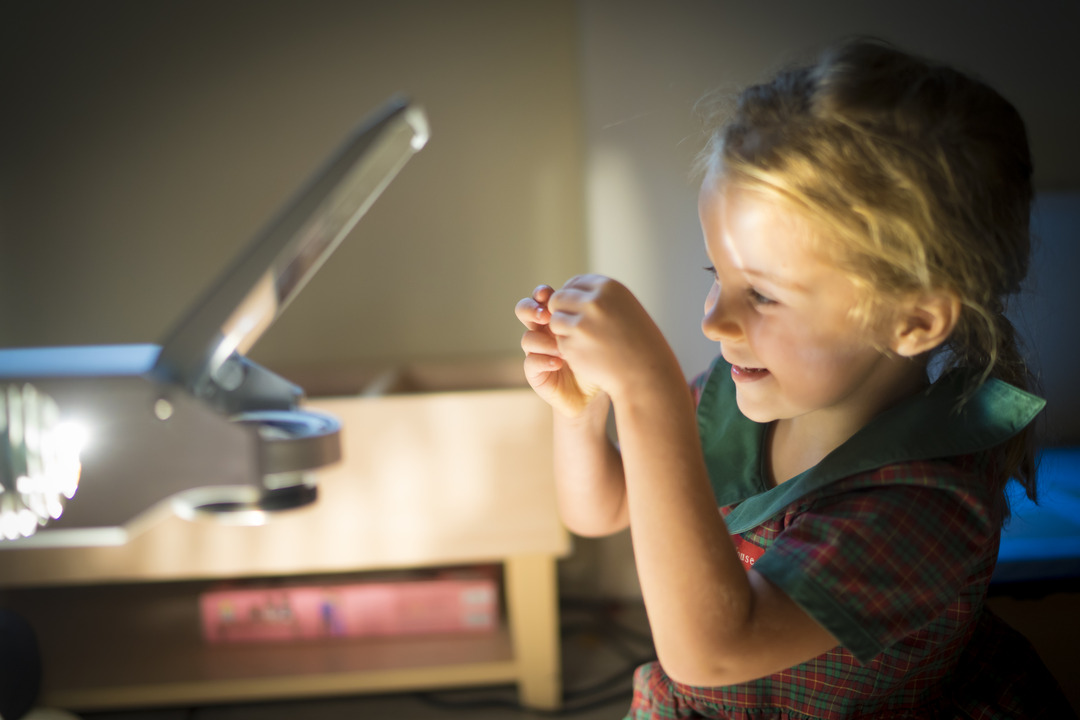
REACH - Reggio Emilia in Asia for Children
The Story of REACH
The story of REACH
In October 2009, whilst attending one of the study schools in Reggio Emilia, representatives of EtonHouse were approached to meet with Amelia Gambetti, educator and International Network Coordinator, Consultant to Reggio Children to explore the possibility of convening an International Conference in Singapore as a collaboration with Reggio Children.
The proposed conference had tight timelines associated with it as Reggio Children had a full year of conference commitments. The one requirement was that the conference had to be convened the first week of March 2010.
Back at home, there was a great deal of excitement, anticipation and concern as to how to proceed with the enormous task of organising a conference in less than 6 months. The outcome saw a very positive collaboration between EtonHouse and AECES (Association for Early Childhood Educators Singapore) to host the first Reggio Children conference in Asia. Delegates numbered 470 and attended from 11 Asia Pacific countries.
Amelia Gambetti and Emanuela Vercalli along with representatives of the International Network, Jan Millikan and Helene Oberman, (REAIE: Reggio Emilia Australia Information Exchange); Margie Cooper and Beth Macdonald, (NAREA: North America Reggio Emilia Alliance); Harold Gothson (Reggio Emilia Institutet, Sweden) and Moonja Oh (KAREA: The Korean Association for the Reggio Emilia Approach), provided for delegates an amazing three days of deep thinking and reflection.
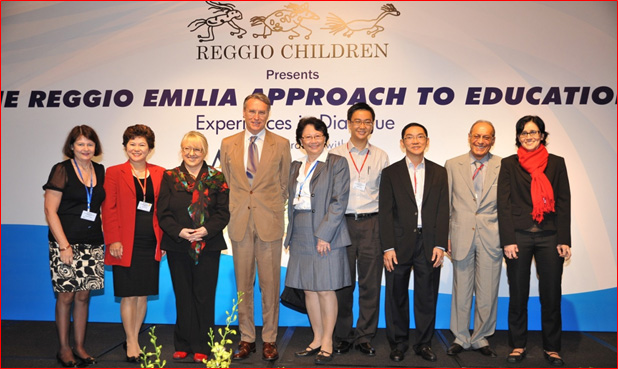
As part of this conference in 2010, Reggio Children co-ordinated a meeting of representatives from preschools/International schools in Singapore and other Asian countries, as well as International Network members, to reflect together on what an International Network might look like within the Asia region.
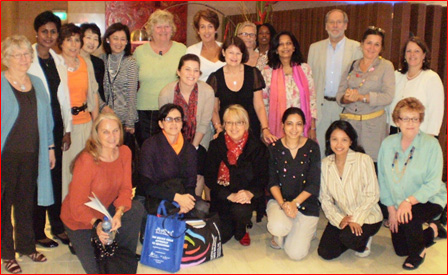
Since that time, REACH has not only participated in other International Network conferences sharing the work being undertaken in Singapore e.g. AREA (African Reggio Emilia Alliance 2011 and 2012); and REAIE (Reggio Emilia Australia Information Exchange 2013), but has also convened, in 2012, a second conference with speakers Ivana Soncini and Paola Cagliari, along with translator, Jane McCall, all directly from Reggio Emilia. These opportunities both strengthen our connections with others and support our own professional learning.
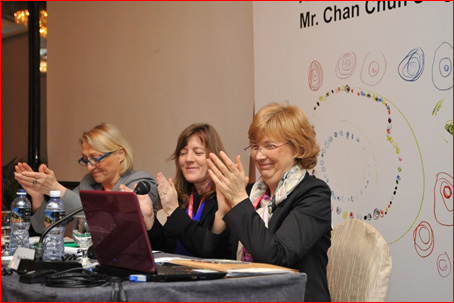
Listening to children – What does REACH mean?
To demonstrate our respect and advocacy for children’s rights, we invited a group of children to work with us, in an advisory capacity, to reflect on the meaning of ‘reach’. The children indicated it meant to ‘reach out’ to make a connection…
What does ‘connection’ mean?
- It means coming together.
We invited children to ‘draw’ their ideas about coming together, so that we could understand different interpretations of ‘coming together’. However, they indicated you did not need words, to connect…
- Hands connect:
- You connect by moving your eyes and connecting with another people’s eyes. We look at their eyes, connect and talk.
We asked the children, how to share this thinking with others, this idea of ‘showing’ connections. They shared with us, the idea of a ‘logo’.
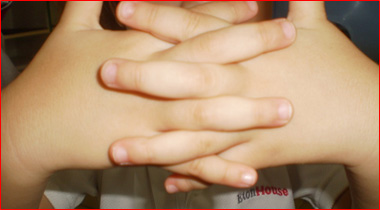
What is a logo?
- A picture – to say something
- It means you can say something without words
- You can say what it means, without writing
In searching for a logo to represent REACH’s identity, of reaching out and making connections we then invited Carnegie Koh Ding Feng, to re-visit his drawing of his giraffe, whose long neck symbolises the s-t-r-e-t-c-h of connecting with others. We therefore introduce to you Chang Jing Lu.

Learn more about The story of REACH.












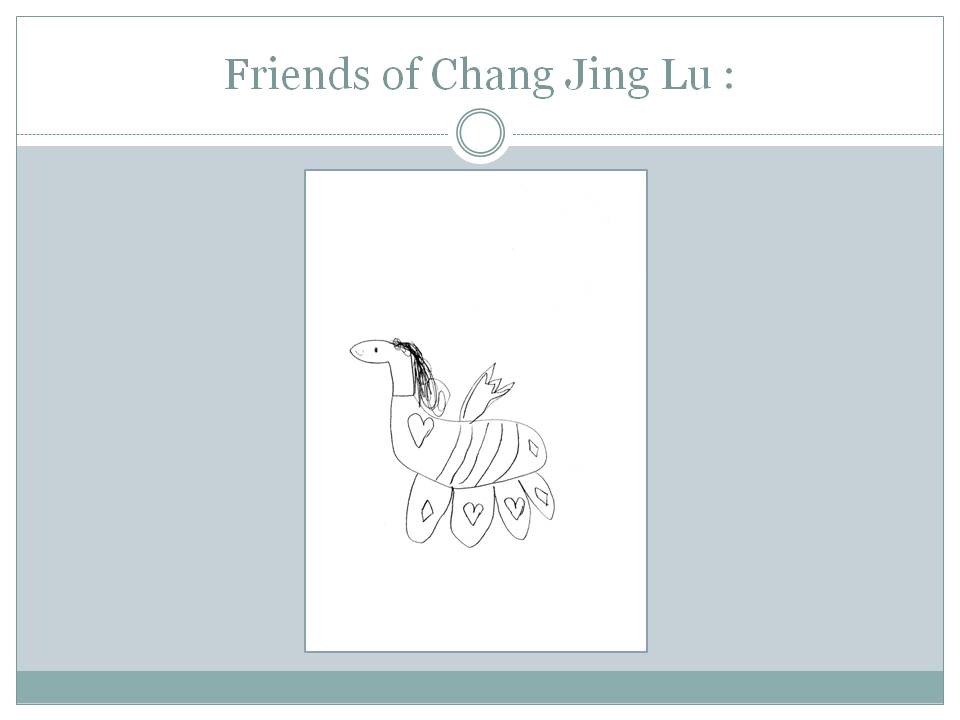

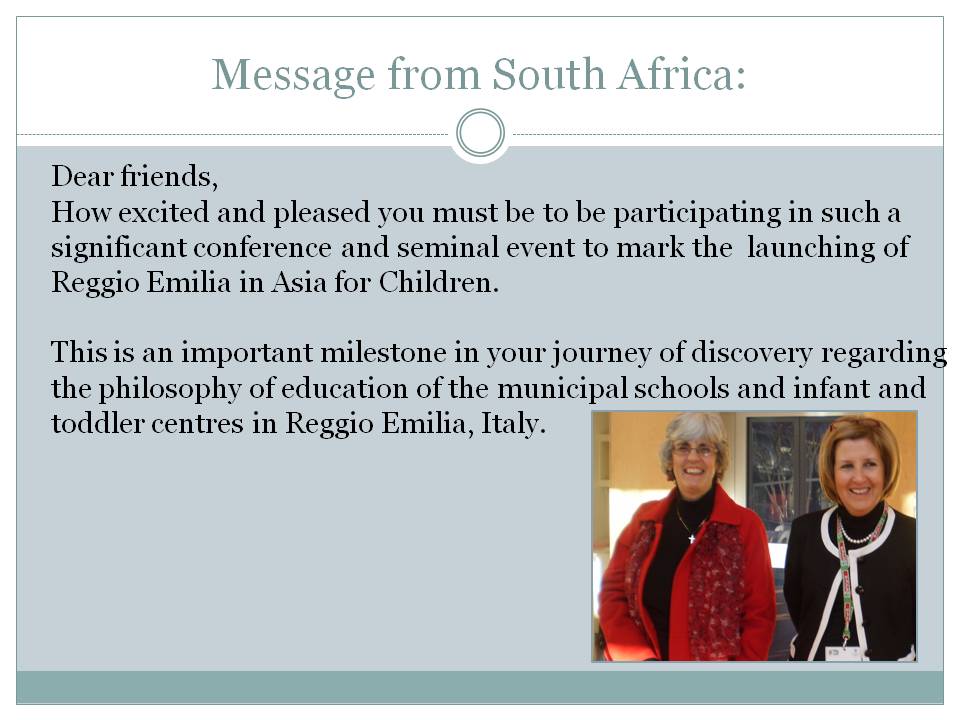
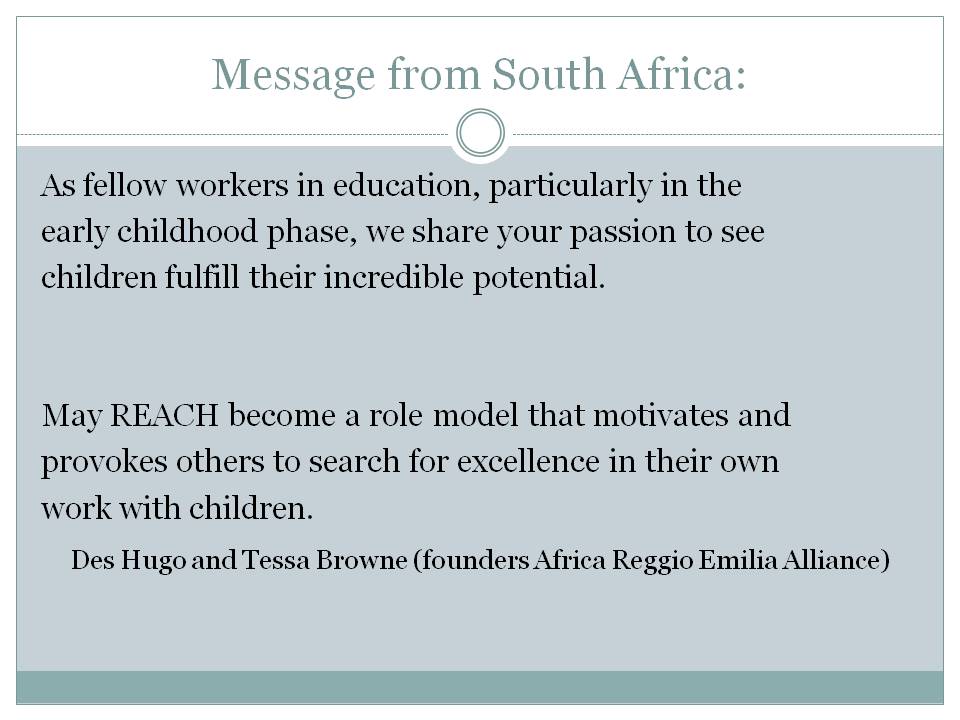
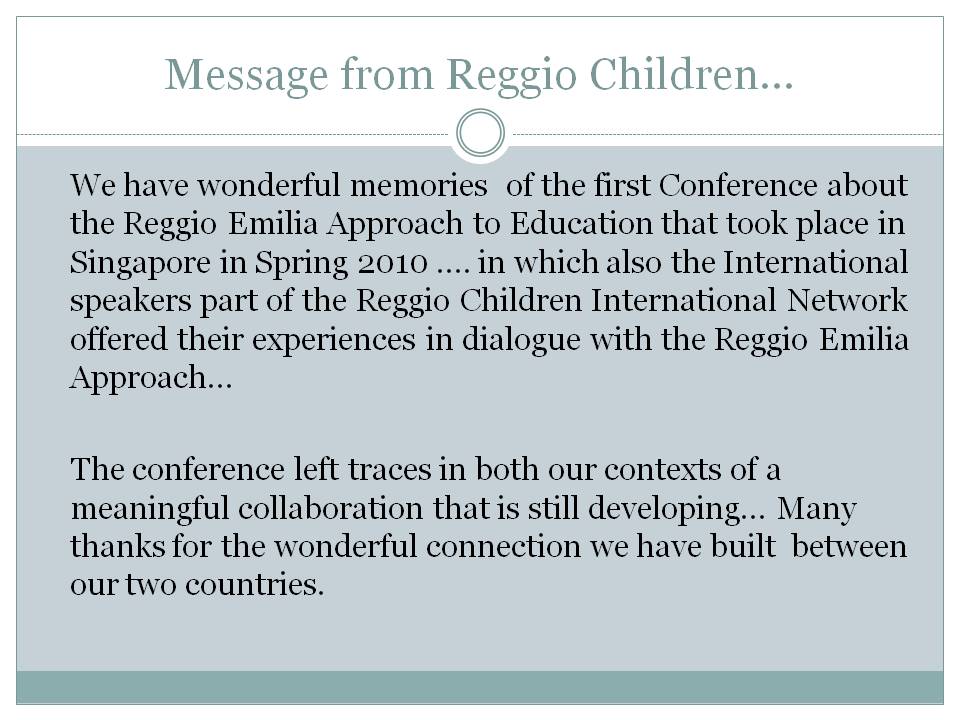
Message from EtonHouse
Dear All,
It gives me great pleasure and a wonderful sense of pride in sharing with you that EtonHouse has signed the agreement with Reggio Children to start the Asia chapter of the Reggio Children International Network (for further information www.reggiochildren.it).
As most of you know, the Reggio Children International Network is present in many parts of the world. It represents the various reference points of Reggio Children in many countries of the world. The Network is a sort of transnational project of the educating community of Reggio Emilia, Italy that maintains an international dialogue and shared responsibility, with the aim to support the identity and work of Reggio Children and of the Loris Malaguzzi International Center. The International Network has the responsibility to offer the opportunity of drawing on each other’s theory and practice, with the Reggio Emilia Approach remaining central to the identity of the Reggio Children International Network.
Some of the network’s reference points are the NAREA in North America, Nordic Network for the Nordic countries, Red SOLARE of the Latin American countries, REAIE in Australia and so on. It is indeed a privilege to be the first organisation in the region to establish this relationship with Reggio Children and be given the opportunity to support, uphold, sustain and disseminate the values, culture and heritage of the Reggio Emilia approach in Asia.
There are several pre-schools in Singapore and in the region who work closely with the principles of this approach, hailed by Newsweek as the best in the world. However, there are no professional development initiatives for educators to subscribe to in order to ‘learn’ this approach. There are several professional development sessions in Reggio Emilia in Italy that educators from all over the world attend in order to understand this approach better and get inspired from it. However, not everyone can attend these sessions. The international network organizations thus help to share the principles of this approach (amongst pre-schools that are inspired to this thinking) as well as bring to the region exhibitions and speakers from Reggio Emilia. The start of this network in Singapore will provide many such opportunities to the educators in Singapore and the surrounding region to bring in the inspirations from this approach into their own settings.
This is a very significant milestone for EtonHouse and the region and we are very proud to be at the forefront of it. The signing of the agreement is a culmination of years of collaboration with Reggio Children and the International Network through the various conferences, visits, professional development sessions, exchanges and dialogues. In March 2010, EtonHouse along with AECES brought the first Reggio Children conference to Singapore. It has been a beautiful and meaningful learning journey for us as a group and I thank each one of you for your support and commitment to this process. We shared images of our schools with the International Network delegates. They were much appreciated and surely left a strong impression of the wonderful work we do here in our campuses in EtonHouse.
This agreement will be the beginning of more collaboration, research and knowledge sharing with our colleagues in Reggio Emilia and the International Network and will strengthen our practice even further. We plan to organise conferences in Singapore, China and in other countries in the region as well as bring the ‘Wonder of Learning’ exhibition to this part of the world for the very first time.
I am very excited about the possibilities and various opportunities this would bring to EtonHouse and the early childhood community in Asia.
I have attached some glimpses of our visit. Thank you again for your support.
Best wishes,
Mrs Ng Gim Choo
Founder and Managing Director
EtonHouse International Group



Message from Bipasha Minocha, CEO of REACH
Dear colleagues,
It is with a profound sense of humility that I pen my first message to you as CEO of Reggio Emilia in Asia for Children (REACH). My journey with the Reggio Emilia Approach began in 2007, a journey initiated through my Diploma in Early Childhood Teaching at the EtonHouse Education Centre. Little did I realise then how transformative this path would be, not only shaping my professional trajectory but also profoundly influencing my perspective as a parent. The Reggio Emilia Approach has been, without a doubt, a continuous gift, facilitating change and growth in ways I could never have imagined. I am deeply thankful for this journey.
Reflecting on our last conference in Shanghai in late 2023, my eighth in helping to orchestrate, I was once again struck by the enduring power and transformative potential of our collective engagements. The content and interactions were as impactful as ever. Delving into the new publication ‘The Role of the Pedagogista in Reggio Emilia’ by Stefania Giamminuti, Paola Cagliari, Claudia Giudici and Paola Strozzi recently, I found myself reflecting on the profound influence this approach has had on generations of educators, continually inspiring both our professional endeavours and our personal lives. Here are my top reflections:
Formazione Permanente – This principle challenges the traditional notion of ‘knowledge as static,’ a belief that once we attain our qualifications, we are set for life in our educational journeys. Instead, we have come to understand that ‘formazione’ is a lifelong commitment. It is a privilege that enriches not only ourselves but also our communities. It ignites in us a child-like curiosity, driving us to continually enrich our lives and those around us.
Transformations from Within – A cornerstone of the Reggio Emilia Approach is its emphasis on the collective as a value and on the reciprocity of professional learning. It advocates for changes in our practice that are contextualised within our own environments, driven by a deep understanding of these settings rather than dictated by a notion of hierarchy. This principle ensures that our evolution as educators is both authentic and meaningful to our communities. It is a relational process where ‘you affect change and are also affected in the process’.
The Power of Reflective Practice – My initial foray into early childhood education began with an exploration of my own ‘image of the child.’ This reflection was not only transformative but also life-changing. It lies at the heart of our interactions with young learners, prompting us to confront deep-seated beliefs, biases, and the historical and cultural contexts that shape us. This reflective practice is transformative, altering us not just professionally, but on a personal level as well.
As we embark on reigniting REACH, exploring the myriad possibilities it unfolds for us as a collective of change-makers, collaborators, advocates for children’s rights, and champions of lifelong learning, I invite you to join me in this reflective journey. Let us contemplate how we have evolved, both as professionals and as individuals, and commit to deepening our engagement with the Reggio Emilia educational project, within our communities and beyond.
Together, let us continue our transformative journey, embracing the opportunities for growth and innovation that lie ahead. Your dedication, passion, and commitment to education inspire me daily, and I am excited to see where our shared path will lead us.
With warmest regards and deepest respect,
Bipasha Minocha
Chief Executive Officer
Reggio Emilia in Asia for Children (REACH)

References
Book: Giamminuti, S, Cagliari, P, Giudici, C, Strozzi, P (2024). The Role of the Pedagogista in Reggio Emilia. Routledge.
Vision
Empowering Early Childhood Leaders: REACH ignites and fosters excellence in early childhood education across Asia, inspiring educators to champion children’s voices and nurture their limitless potential.
Mission
REACH cultivates a vibrant ecosystem of learning:
- Empowering: Leading with expertise and innovation, providing access to valuable resources and fostering professional development within the early childhood community
- Connecting: Serving as a hub for Reggio-inspired educators, facilitating meaningful dialogue, collaboration, and knowledge exchange across the region.
- Advocating: Championing children’s rights and active participation through research, observation, and amplifying their voices.
- Partnering: Collaborating with Reggio Children and other key stakeholders to build a future where every child thrives in nurturing and respectful learning environments.
